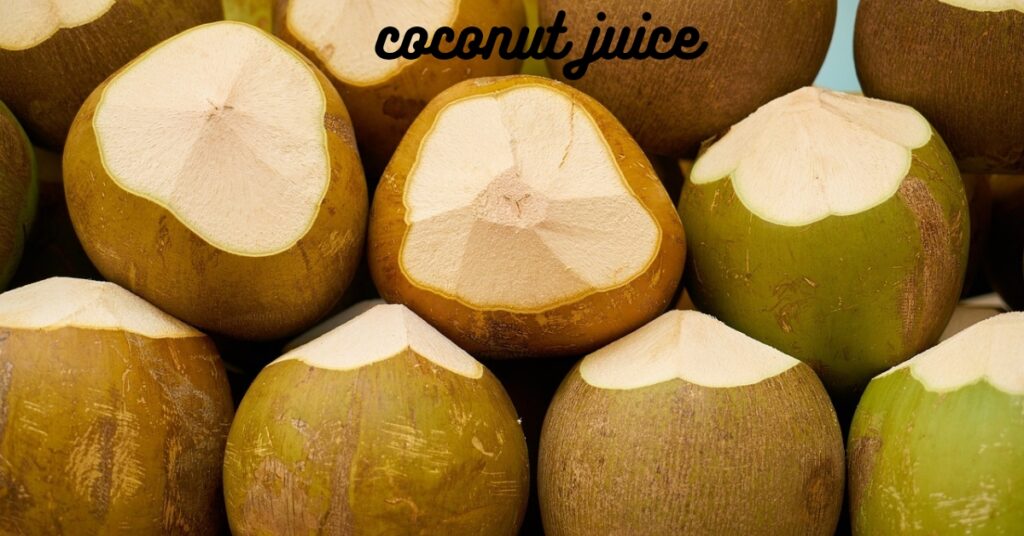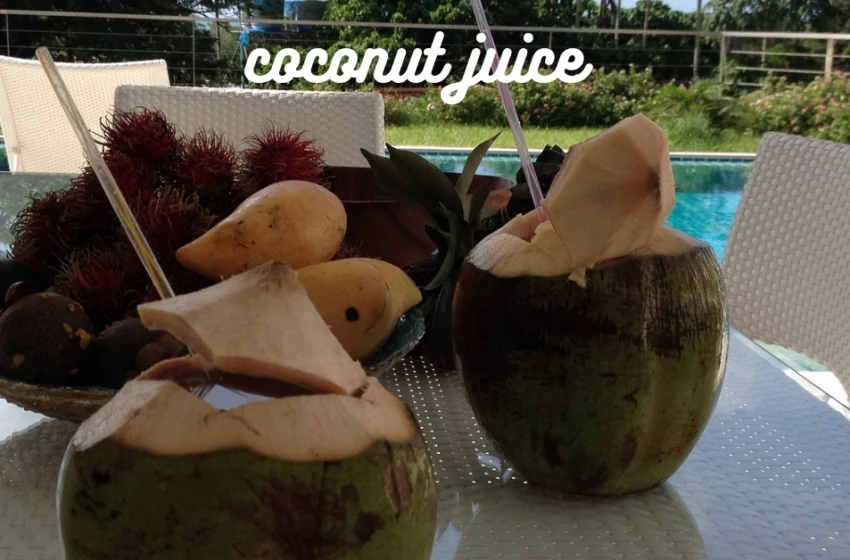How to make best coconut juice:
During summer days I feel like drinking something cold. Most of the people consume easily available cold drinks. Cold drinks are easily available everywhere and it is easy to drink them anywhere. Whereas making homemade drinks takes time. This is the reason why people like things which are ready instantly. The increasing trend of instant drinks affects health. To overcome this problem, why not prepare such drinks which can be made in 2 to 3 minutes. Come, we have given step by step the method of making best coconut juice.(New Cactus Juice Recipe and benefits in side effects)
Material
1 ripe coconut
Water
equipment:
Knife
hammer or hammer
strainer or cheesecloth
bowl or pitcher
Instruction
- Choose a ripe coconut. You can tell if a coconut is ripe by shaking it; You should hear the sound of water falling inside.

- Use a knife to carefully pierce the softest eye of the coconut. With this you will be able to extract water from the coconut.
- Place the coconut over a bowl or pitcher and drain the water through the slotted hole. If you wish, you can filter the water to remove any impurities.
- When the water drains out, place the coconut on a hard surface. Use a hammer or mallet to tap firmly around the circumference of the coconut until it breaks.
- With the help of a knife or spoon, separate the coconut pulp from the shell.
- Cut the coconut pulp into small pieces and put it in a blender.
- Add water to the blender. The amount of water depends on how thick or thin you want the coconut juice. For thicker juice, use less water; For thinner juice, use more water.
- Mix coconut pulp and water until smooth.
- Place a strainer or cheesecloth over a bowl or pitcher, then pour the blended coconut mixture through the strainer to remove any remaining pulp.
- Press the pulp through a strainer to remove as much liquid as possible.
- Discard the pulp or save it for another use, such as making coconut milk or coconut flour.
- Chill coconut juice in the refrigerator for a refreshing drink, or serve immediately over ice.

Enjoy your homemade coconut juice!
thank you
benefits of coconut juice
Coconut juice, also known as coconut water, offers many health benefits:
Hydration
Coconut juice is a natural isotonic drink, meaning it contains electrolytes like potassium, sodium and magnesium, which help replenish fluids and maintain hydration levels in the body.
Rich in nutrients
Coconut juice is low in calories and fat, but rich in vitamins and minerals, including vitamin C, calcium and manganese. These nutrients support overall health and well-being.
Electrolyte Balance
Due to its electrolyte content, coconut juice can help restore electrolyte balance in the body after exercise or excessive sweating. This makes it a popular choice for post-workout hydration.
cardiovascular health
Some studies suggest that coconut water may help lower blood pressure and reduce the risk of heart disease due to its potassium content, which helps control blood pressure and maintain heart health.
digestive Health
Coconut juice contains fiber, which may support digestive health by promoting regularity and preventing constipation.
Antioxidant Properties
Coconut water contains antioxidants, such as cytokinins, which may help reduce oxidative stress and inflammation in the body, potentially reducing the risk of chronic diseases.
weight management
Coconut juice is low in calories and fat, making it a suitable choice for people who want to control their weight. This can help you feel full and satisfied, making you less likely to overeat.
Overall, coconut juice is a refreshing and nutritious drink that offers many health benefits when consumed as part of a balanced diet.
Side effects of coconut juice
While coconut juice is generally considered safe for most people when consumed in limited amounts, there are some potential side effects to be aware of:
High potassium levels
Coconut juice is naturally high in potassium, which may be problematic for individuals with kidney problems or those taking medications that affect potassium levels. Excessive potassium intake can cause hyperkalemia, a condition characterized by high levels of potassium in the blood, which can be dangerous, especially for people with kidney problems.
Allergic reactions
In rare cases, some individuals may be allergic to coconut or coconut products, including coconut juice. Allergic reactions can range from mild symptoms such as itching or hives to more serious reactions such as difficulty breathing or anaphylaxis. If you have a known allergy to coconuts or tree nuts, it is important to avoid coconut juice and other coconut products.
High Sugar Content
While coconut juice has a lower sugar content than many other fruit juices, it still contains natural sugars. Consuming large amounts of coconut juice on a regular basis may increase sugar intake, which can have negative effects on blood sugar levels, especially for individuals with diabetes or those monitoring their sugar intake.
Gastrointestinal Problems
Some people may experience digestive problems like bloating, gas or diarrhea when drinking coconut juice, especially if they have a sensitive stomach or are not used to drinking it. To avoid digestive problems, it is important to listen to your body and consume coconut juice in limited quantities.
Interference with medications
Coconut juice may interact with certain medications, especially those prescribed for high blood pressure or kidney problems. The potassium content in coconut juice may affect the way these medications work in the body. If you are taking medication, it is best to consult your healthcare provider before adding coconut juice to your diet.
Overall, while coconut juice offers many health benefits, it is important to consume it in limited amounts and be wary of any potential side effects, especially if you have underlying health conditions or allergies. If you experience any adverse reactions after consuming coconut juice, discontinue use and consult a health care professional.
If you like this information please comment.


